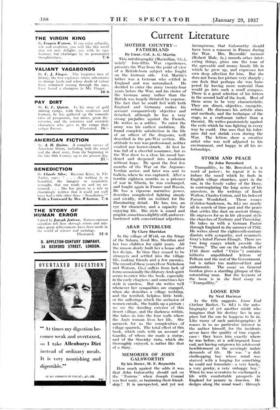MOTHER COUNTRY- - FATHERLAND
Current Literature
-nearly- four-fifths War- experiences, presents the War from the point of view of a British-born subject who fought on the German side. Col. Martin's father was a German who settled in
England and was naturalised. He decided to enter the army twenty-four years before the War, and his choice of the German army rather than the British was largely dictated by expense. The fact that he could feel with both England and Germany makes his account comparatively objective and detached, although he has a very strong prejudice against the French.
He writes as a soldier. To enter the army was his earliest ambition. He found complete satisfaction in the life of an officer of the dragoons, well described in the pre-War section. His attitude to war was professional, neither exalted nor horror-struck. At first he was full of a cheerful assurance, but as the War drew to a close his mood har- dened and deepened into resolution without hope. He spent the first few months of the War on the Argonne- Verdun sector, and later was sent to Galicia, where he was captured. After a terrible eighteen months as a prisoner of war in Siberia, he was exchanged, and fought again in France and Russia. He has a vigorous narrative power, describes complicated fighting simply and vividly, with an instinct for the illuminating detail. He has, too, an eye for character, and a capacity for enjoying life. His style is sound and graphic, sometimes slightly stiff, and over- burdened with conventional adjectives.






















































 Previous page
Previous page